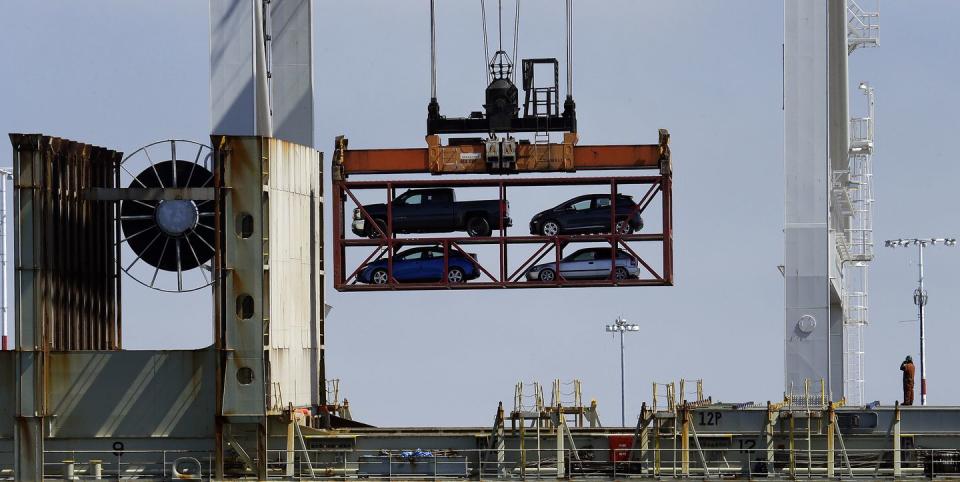Automaker Groups Are Fighting Trump Tariffs

Automakers are letting the Trump administration know what they think about its exploration of slapping tariffs on all foreign-made cars and trucks: They don’t like it.
The Alliance of Automobile Manufacturers, which represents General Motors, Ford, Toyota, Volkswagen, and others, said the tariffs will essentially be a tax on consumers and lead to job losses. “While we understand that the Administration is working to achieve a level playing field, tariffs are not the right approach,” the group said in a public comment filed with the Federal Register. “Tariffs on autos and auto parts raise vehicle prices for all customers, limit consumer choice, and invite retaliatory action by our trading partners.”
The Trump administration has threatened to apply tariffs of up to 25 percent on all imported passenger vehicles, and most recently the president tweeted about a possible 20 percent tax on cars and trucks coming from the European Union. The administration has already announced 25 percent tariffs-effective July 6-on hundreds of industrial goods coming from China, including automobiles. It’s a response, the administration said, to years of unfair trade practices by the Chinese.
Last month, the Commerce Department announced a Section 232 investigation into automobile imports. As part of the Trade Expansion Act of 1962, a Section 232 investigation is a rarely employed measure used to cite national-security concerns as justification for duties on foreign products. It was invoked in the Trump administration’s defense of its import tariffs of 10 percent on aluminum and 25 percent on steel.
Public comments on the auto-tariffs investigation are due by July 13, and the U.S. Department of Commerce has set a public hearing for July 19 and 20. The investigation is expected to conclude by August, perhaps earlier.
While a 25 percent tariff is not certain, the Alliance said that, based on that duty, buyers of imported cars would pay an average of $5800 more per vehicle, citing Commerce Department data. The group said this amounts to a $45 billion tax on consumers, based on 2017 auto sales, and would lead to a reduction in sales and production and subsequent significant job losses.
In another public comment, the Association of Global Automakers wondered what national-security grounds there are for a Section 232 investigation, echoing the sentiment of lawmakers from both parties. Such a rare move is supposed to be used to ensure the U.S. military can obtain products in a timely matter and is not intended to be applied to broad economic production, the group said. “America does not go to war in a Ford Fiesta,” the group noted. Like the Alliance, it said the duties would result in increased cost to consumers, lower vehicle production, and lost jobs.
The Korea International Trade Association (KITA), which represents Hyundai and Kia, asked for an exemption to any tariffs on auto imports from South Korea. It noted that the United States and South Korea had just reworked a trade agreement that calls for opening the country to more U.S. autos while also extending U.S. tariffs on pickups from South Korea for another 20 years.
And Toyota filed a comment that said a 25 percent tariff on automotive imports “would increase the cost of every vehicle sold in [the United States].” That includes even the Toyota Camry, which it builds in Georgetown, Kentucky, since tariffs on parts would lead to a cost increase of $1800, the company said. “We believe the only plausible outcome of this investigation is to reject the notion that automotive imports threaten national security,” Toyota said in its comment.
In general, as Bernard Swiecki, assistant director for the industry, labor, and economics group at the Center for Automotive Research, pointed out to C/D last week, car companies dislike dealing with uncertainty in their already elaborately woven international supply chains. Automakers could shoulder tariffs in a variety of ways, including raising prices, limiting certain models or trims, or shifting production.
Trump Administration Tariffs Could Boost Car Prices and Limit Choices
Smashing NAFTA Is Harder Than It Seems, Especially When You’re Blindfolded
It’s been suggested that the Trump administration’s tariff threats could be a roundabout NAFTA negotiating tactic. Publicly, the administration has said the tariffs could help reduce the U.S. trade deficit and boost domestic manufacturing, the latter of which has been underscored by the president’s frequently expressed displeasure with companies that announce plans to move some portion of production overseas.
You Might Also Like

 Yahoo Autos
Yahoo Autos 